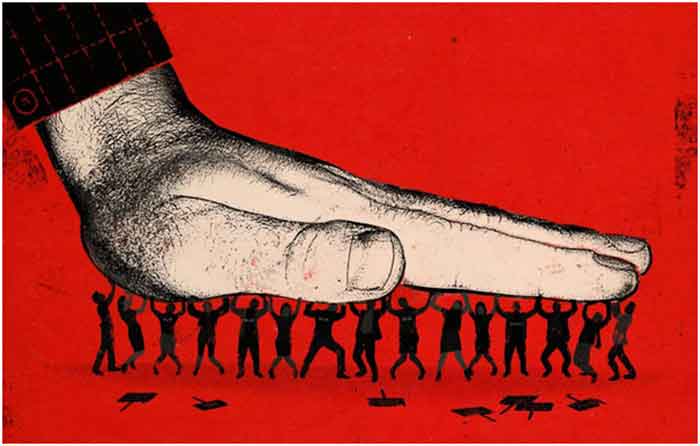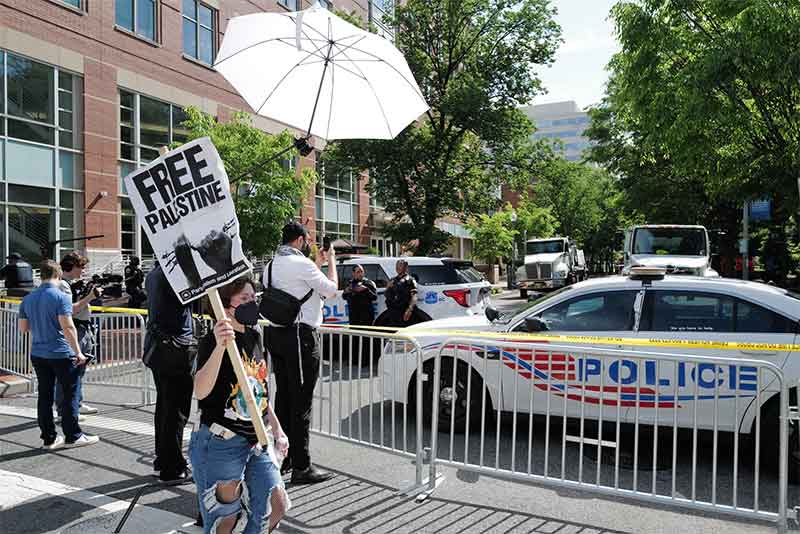
Tradition teaches us that democracy has four pillars – legislature, executive, judiciary and the media. This is not the absolute truth any longer. Each of these has suffered severe distortions over the last several years leaving democracy in peril. Fascist-dictatorial trends assumed political dominance and democracy goes kaput! Peoples power is an additional pillar needed to remedy the total collapse of democracy.
India confronts the grim possibility that democracy may give way to covert and overt forms of dictatorship. Ordinary MLAs and Ministers show little intent to reflect on peoples aspirations. Fascism assumes far-right, authoritarian ultra-nationalist characteristics, forcibly suppresses opposition, and strongly regiments society and the economy.
The cornerstones of democracy include freedom of assembly, association, property rights, freedom of religion and speech, inclusiveness and equality, citizenship, consent of the governed, voting rights, freedom from unwarranted governmental deprivation of the right to life and liberty, and minority rights. Freedom of speech, assembly, religion and the right to a fair trial are non-negotiable dimensions of democracy. Voter enfranchisement and political participation are democratic ideals to guarantee engagement of citizens in the political sphere. There is growing fear that India may be descending into fascism or already be knee-deep in the ideology. Facets of Goan politics mirror these trends.
Countrywide, under the Congress and BJP, citizens have in the last few decades witnessed the institution of laws that visibly violate the rights of any group or individuals who dare to challenge the powers-that-be. In this context, the Supreme Court’s (SC) decision instruction to the centre to keep at abeyance all cases falling under the Sedition Act until its provisions are reviewed is a welcome departure from judicial complicity. No FIR will be registered under its provisions be it from the Centre or States. Encouragingly, people have seen challenges to incongruous government choices from the SC and High Courts. .
The Chairperson of the Movement against UAPA and Other Repressive Laws (MURL), Justice Kholsa Patel, at a press conference last week underlined that “Freedom of Speech and Expression are the basic principles of a Democracy and these (are) being targeted and compromised due to the Sedition Law”. He called for an agile and alert democracy to actively participate in political discourse and express their constructive criticisms or views of the government policies”. Justice Khosla grieved that “Sedition Laws have empowered the Executive and Administrative Branches of the Government to use these ambiguously defined provisions as an instrument to regulate, suppress and smother public opinion and wield power indiscriminately”.
Human Rights and Social activists are being intimidated and compelled to conform to anti-people government policies and programmes which affect the common person. Police threaten them saying they are being ‘watched/followed’ simply for asserting constitutional rights. The Sedition Law suppresses protesting voices and especially the interests of those who live in the margins of society. These include workers, landless and marginal farmers, Dalits, Tribals, women, and religious minorities.
Over the years human rights activists have persisted in nationwide campaigns against Repressive laws and mechanisms under the control of the government. The call of the Supreme Court (SC) for review of the Sedition Law and the possibility that the Armed Forces (Special Powers) Act (AFSPA) will soon be revoked, gives human rights activists hope. Still, the government still retains certain tyrannical laws namely the National Security Act of 1980 which exists to provide for preventive detention in certain cases and Unlawful Activities Prevention Act (UAPA) – brazen anti-human rights. Law enforcement uses these to threaten activists with jail, detention, and worse – even when the protests are within the framework of law. The UN Declaration of Human Rights decrees that everyone charged with a penal offence has the right to be presumed innocent until proved guilty according to law in a public trial with all guarantees for her/his defence. These laws need to be repealed to restore a thoroughly constitutional democracy. The essence of democracy, after all, provides citizens the right to dissent.
In Goa, the protesters against the double-tracking project were harassed and humiliated and often subject to police brutalities. The persistent and successful defiance of activists and villagers means that the powerful pro-double-tracking lobbies now potentially have the doors shut on their designs. Recommendations of a Centrally Empowered Committee (CEC) upheld by the SC asserted that the projects had no justification and would only serve to obliterate eco-systems so imperative to Goa’s existence. In 2021, the Goa Government had to bow before peoples pressure to withdraw the IIT project in Melaulim but not before police had unleashed brute force on the people. The police trampled over women’s bodies during a lie-down protest on the street. This should be a case that the State Police Complaints Authority must pursue suo moto with some tough punishments meted out to the errant officers. Goans have met with many success stories of peoples protests – the anti CAA being a recent example.
When people unite to assert their rights, they risk the long arm of the law, but sheer numbers and the moral standing of their cause will force the government to withdraw. People’s assertion and steadfastness is a potent blend for people’s victory. Protest that is just encourages discernment of the incongruities of unjust governance and the horror of oppressed lives. Social protest is saying we can express dissent in a peaceful and dialogical way, without compromising democratic principles. Indeed people’s power is the fifth pillar of democracy- easily the most vital pillar.
Citizens who care about validating democracy need to be resolute in their stance that politicos are merely stewards of the State – not its owners. Politicos, on the other hand, must serve with humility, accountability and truthful service.
Ranjan Solomon is a human rights activist, political commentator who believes that peoples’ power is a non-negotiable instrument to further democracy and justice.









































